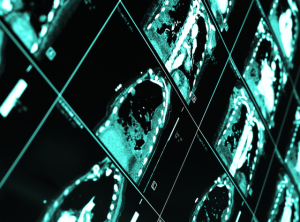by
Lauren Dubinsky, Senior Reporter | July 09, 2015
Taking the results of a research study and applying them to the real world is a difficult thing to do, but Intermountain Medical Center was able to do just that. Since implementing a comprehensive lung cancer screening program 18 months ago, they have successfully diagnosed three people with early-stage lung cancer.
"It was really gratifying that we were able to replicate those results and find those patients," Dr. Denitza Blagev, one of the program leads and a pulmonologist at the hospital, told HCB News. "We essentially showed that in this population, if we select people who meet the criteria then you still find the same results that were found in the research setting."
The program is based on the findings of the National Lung Screening Trial, which compared CT with standard X-ray scans for detecting lung cancer. It found that patients who underwent CT exams had 15 to 20 percent lower risks of dying compared to those who underwent an X-ray exam.



Ad Statistics
Times Displayed: 173325
Times Visited: 3162 For those who need to move fast and expand clinical capabilities -- and would love new equipment -- the uCT 550 Advance offers a new fully configured 80-slice CT in up to 2 weeks with routine maintenance and parts and Software Upgrades for Life™ included.
Replicating the results in the real world is challenging because in a research setting, the patients are people who consented and are more likely to be adherent to therapy, and educated, than the average patient. In addition, a research study has coordinators who are following up with the patients.
"In the real world, it's a little bit different because people may or may not come for follow-up studies," said Blagev.
The other concern is that they will find incidental findings of the thyroid, liver or breast. The physicians will then have to investigate findings that they wouldn't have found otherwise and probably won't affect the patient in the long term.
"But now we have increased the cost of care and have made people anxious about their thyroid nodules or breast cyst," said Blagev.
The program at Intermountain was tested from September 2014 to March 2015. It initially had 375 patients undergo CT scans and 272 were eligible to continue in the program.
Out of those who were eligible, 19 of their scans found evidence of malignant cancer and 11 were then confirmed malignant. Eight of the 11 were confirmed to have lung cancer and three of them were considered early stage lung cancer.
It is considered a success if they can prevent just one cancer death for every 320 patients screened, said Blagev. This program was able to detect three early-stage lung cancers in the first 357 patients screened, which she described as "incredible."
In February, CMS announced that it will provide reimbursement for annual low-dose CT lung cancer screening under certain conditions. The individuals must be Medicare beneficiaries who are 55 to 77 years of age, current smokers or have quit smoking in the last 15 years, have a smoking history of at least 30-pack years and receive a written order from a physician who meets certain requirements.
Blagev hopes that other hospitals will implement a program like theirs, but she acknowledges that there are a lot of hurdles in the way. A program like this requires quite a bit of coordination between radiologists to read the images in a standardized way.
In addition, Blagev said it's difficult for her to imagine the pulmonologists conducting the counseling visits, so it will probably be the responsibility of primary care physicians. They must develop a system for how to educate primary care physicians on the complicated issues of lung cancer screening so they are better able to counsel their patients.

